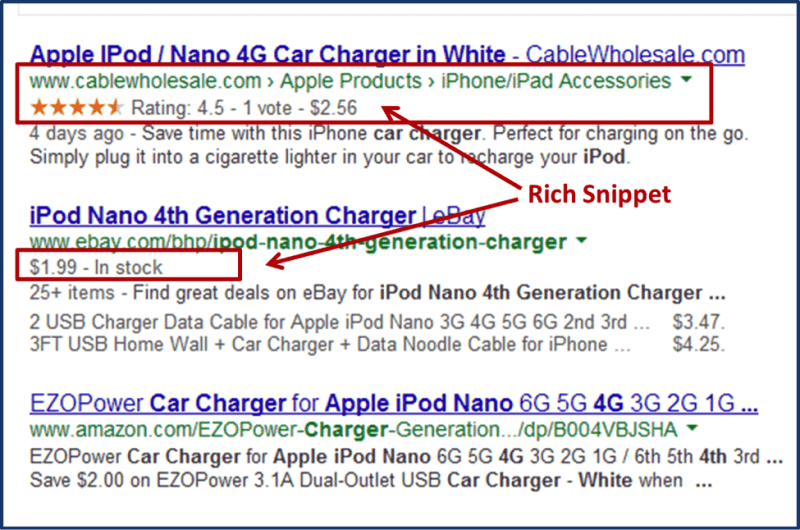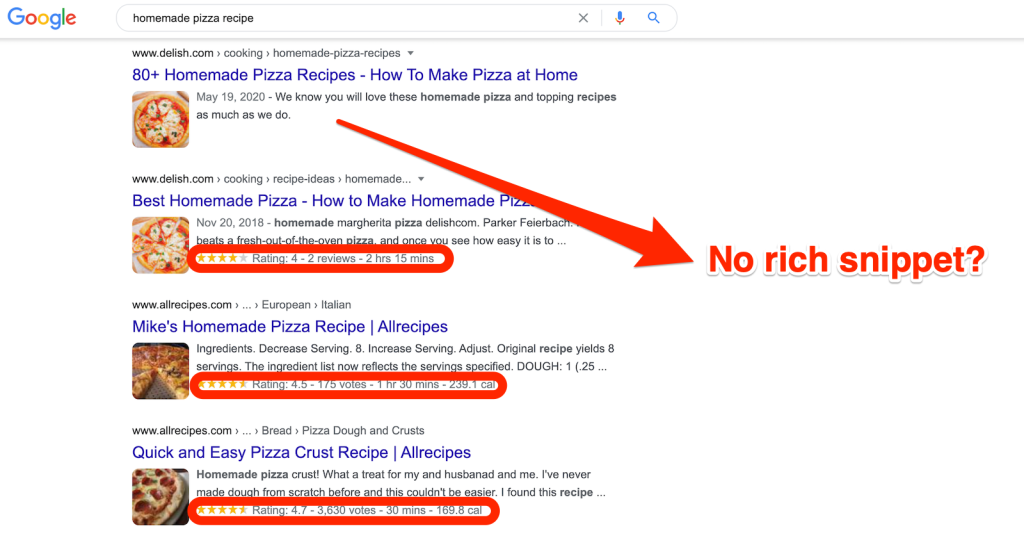As the digital world changes, search engines have become the main way to find information, with Google being the most popular. Google has introduced various features to enhance the search experience and provide users with the most relevant results.
Among these features, rich snippets have emerged as a potent tool for webmasters to improve their online visibility and attract organic traffic. In this article, we will explore the concept of rich snippets, how they function, and the benefits they offer to users and website owners.
Page Contents:
What are Rich Snippets?
Rich snippets are a type of Google search results that showcases additional information. They are structured data markups that webmasters can use to give search engines more information about their websites.
By implementing this structured data, search engines gain a deeper understanding of a page’s content, enabling them to present relevant details to users in search results. Rich snippets show specific information in a short and visually appealing way, giving users valuable information before they click on a search result.
Types of Rich Snippets
Google supports various types of rich snippets that cater to specific content categories. Some popular examples include:
Reviews: These snippets display user ratings and reviews, allowing searchers to assess the quality and popularity of a product, service, or business. The review snippet shows the number of ratings from 1 to 5 and includes the number of votes. They mostly appear in the rich snippets or in the knowledge panel on the right side.
Recipes: Rich snippets for recipes showcase essential details like cooking time, calorie count, and user reviews, helping users find suitable recipes quickly. These appear on the top of the search engine result page and displays recipes for the same dish from multiple resources.
Events: Rich snippets for events provide important information such as date, time, location, and ticket availability, enabling users to get a comprehensive overview without visiting multiple websites.
Products: E-commerce websites benefit from product-rich snippets, which present details like price, availability, and average ratings, leading to higher click-through and conversion rates.
FAQs: Rich snippets for frequently asked questions display popular queries and their respective answers, allowing users to find concise information and navigate directly to the most relevant sections of a webpage.
How to get Rich Snippets?
Implementing rich snippets requires the inclusion of structured data markup on a website. This structured data is added to the HTML code of a page using formats such as JSON-LD, Microdata, or RDFa. JSON-LD is Google’s preferred format due to its simplicity and ease of implementation. Webmasters can manually add structured data or use markup generators provided by Google or third-party tools.
To obtain rich snippets in search engine results, you need to provide structured data markup on your website. Rich snippets enhance your search listing by displaying additional information about your webpage, such as ratings, reviews, product details, event information, and more.
Understand structured data: Structured data is a standardized format used to provide information about a webpage’s content to search engines. It helps search engines understand the context and display relevant rich snippets.
Identify suitable content: Determine which pages on your website have content that could benefit from rich snippets. This might include product pages, recipes, articles, events, reviews, or FAQs.
Choose a markup format: Select an appropriate markup format to implement structured data. The most common format is JSON-LD (JavaScript Object Notation for Linked Data), which is easier to implement and recommended by Google.
Use structured data markup: Add structured data markup to your webpages using the chosen format. You can manually add the markup or use online schema generators to create the code. Ensure that you follow the specific guidelines for each type of rich snippet you want to display.
Test your markup: Before deploying the structured data on your live website, it’s crucial to test it using Google’s Structured Data Testing Tool or other similar tools. This will help identify any errors or issues with the markup.
Monitor changes: Keep track of updates and changes in search engine guidelines for structured data. Search engines periodically update their requirements, so staying informed will ensure your markup remains compliant and effective.
Submit your sitemap: Once you’ve implemented structured data markup, submit an updated sitemap to search engines, such as Google Search Console. This helps search engines discover and crawl your structured data more efficiently.
Monitor search results: After submitting the markup, monitor your search results to see if rich snippets are being displayed. Remember that search engines determine when and how to display rich snippets, so it may take some time for them to appear, if at all.
Improve user experience: While rich snippets can enhance your search results, it’s essential to focus on providing valuable, high-quality content. Make sure your webpages are user-friendly, informative, and relevant to users’ search queries.
Benefits for Users
Rich snippets have transformed the search experience for users, offering several advantages:
Enhanced search experience: Rich snippets enable users to quickly assess the relevance and quality of search results by providing additional information, saving time and effort.
Informed decision-making: Rich snippets present crucial information, such as ratings, reviews, and prices, at a glance, empowering users to make informed choices without visiting multiple websites.
Benefits for Website Owners
Rich snippets offer compelling advantages to website owners aiming to improve their organic search performance:
Increased visibility: Rich snippets grab attention through visually appealing elements and detailed information, making search results stand out from competitors and increasing the likelihood of clicks.
Higher click-through rates (CTR): Rich snippets entice users by displaying relevant information upfront, resulting in higher CTRs and increased organic traffic to websites.
Improved user engagement: When users find the desired information in search results, they are more likely to engage with the website, leading to longer sessions, reduced bounce rates, and increased conversions.
Rich snippets have transformed the way search results are displayed, providing users with useful information and giving website owners a competitive advantage. Webmasters can improve their online visibility and attract more organic traffic by utilising structured data markup. Rich snippets improve the search experience for users while also providing significant benefits to website owners, ultimately leading to increased engagement and performance in the digital landscape.





